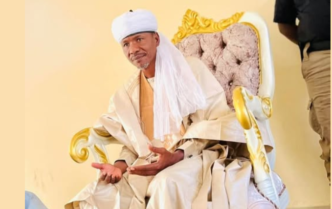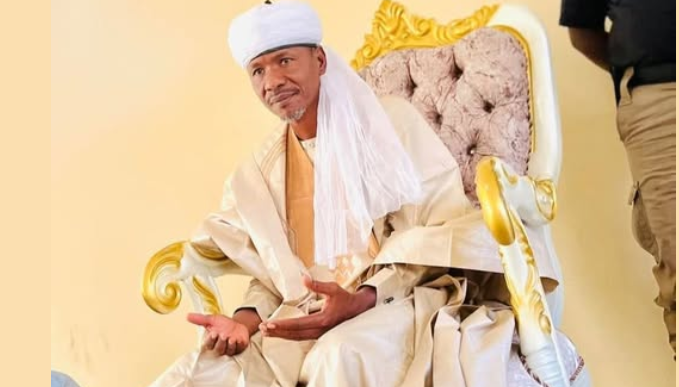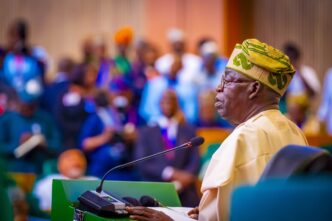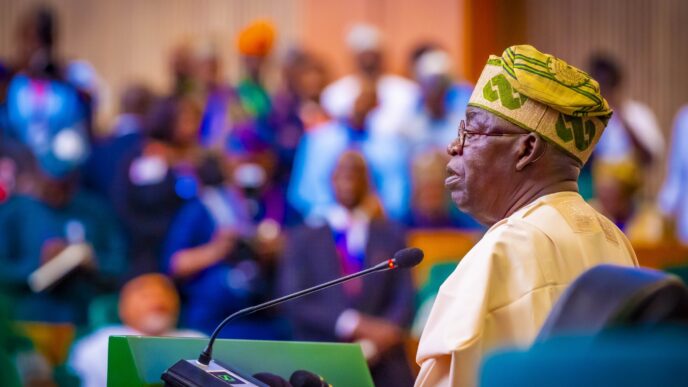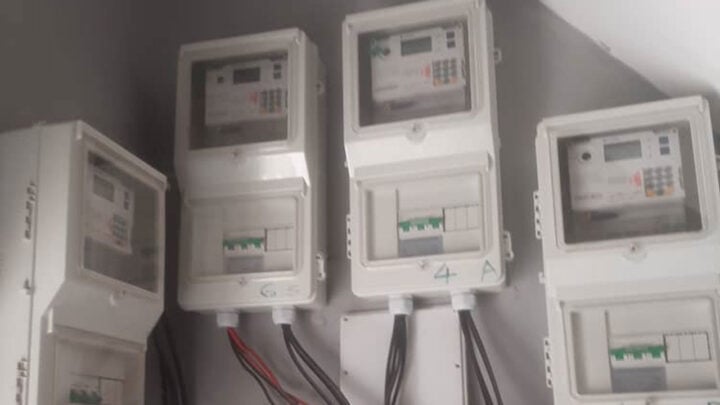Uba Sani, Kaduna governor with Nuhu Ribadu, NSA
BY IDRIS AHMED
At a time when Governor Uba Sani is being lauded for carefully collaborating with the Office of the National Security Adviser, the nation’s Armed Forces and other security agencies to ingeniously craft a Peace Deal that is freeing Kaduna States from the debilitating scourge of banditry, kidnapping and other forms of criminality, some ill-informed and rather mischievous persons have in recent times been scheming to upend the Governors’ achievements, citing non-existent legal hurdles.
In a recent article, the well-known newspaper columnist, Dele Sobowale, comically suggested that by pursuing a peace deal that has led to the successful disarmament and reintegration of dozens of repentant dare-devil bandits and kidnappers, Governor Uba Sani may be committing “treason”. Sobowale posits that Governor Sani was usurping the powers of the Federal Government since, according to him, the Governor was acting unilaterally and possibly ultra vires. “Without mincing words, nothing about it (The Peace Deal) makes sense; and aspects of it might be treasonable,” the conflicted columnist intoned in his article. Of course, his assertion is wrong and unfounded and clearly born out of ignorance. Worst still, his views may well be politically motivated.
Here is the truth: By May 2023, when Senator Uba Sani assumed office as the Governor of Kaduna State, hardened bandits, kidnappers and assortment of other criminal elements held the State by the jugular, making governance or even development almost impossible. The very strategic Kaduna – Abuja major high way was in the firm control of dare-devil bandits and kidnappers who had perfected the nefarious act and art of abducting innocent and unsuspecting passengers for ransom. Since the State’s airport environ was also not safe at the time, visitors and even investors avoided Kaduna State. The State was slipping into comatose.
From the outset, Governor Uba Sani was determined to deploy sustainable solutions to the problem of insecurity in the state. His preferred option has always been a deft combination of kinetic and non-kinetic solutions to a seemingly intractable problem. Governor Uba Sani understands Kaduna State and he is at home with practically all issues concerning the State and the people. “What are the factors that have bred insecurity and banditry in Kaduna and other States in the North-West? Hopelessness, lack of education and lack of economic prosperity. Over 85 percent of the people in the North-West are either not educated or financially excluded,” Senator Uba Sani said a few weeks after he was sworn-in as Governor.
Advertisement
With his job clearly cut out for him, Governor Uba Sani went to work pretty quick and the results of his efforts become instantly evident: Following an enhanced collaboration between the Kaduna State Government, Office of the National Security Adviser and the leadership of the nation’s Armed and Security Forces, the Kaduna – Abuja express way received a deserved respite and travellers, in their numbers, began plying the road regularly without fear or anxiety. The rail service between Abuja and Kaduna which was momentarily halted after a heinous attack that led to the abduction of several passengers, resumed in earnest. Even more importantly, previously traumatized farmers began returning to their abandoned farms.
Senator Uba Sani was the first State Governor, among his contemporaries, to personally take his internal security masterplan to the NSA, the Chief of Defence Staff and the Chiefs of Army, Naval and Air staff respectively. The Governor’s concerted efforts did not go to waste as the leadership of the Armed Forces saw reasons with him and accepted to set up more Forward Operation Bases in Kaduna State.
In the same regard, Governor Uba Sani, got traditional, community and religious leaders across the local government areas of the State involved in the battle against bandits and other criminal elements. At regular security meetings with these leaders, Governor Sani kept all stakeholders properly informed about the direction of his government and what the leadership of the nation’s Armed Forces and other security agencies required of them. The Governor customarily used the opportunity of the security meetings to take contributions from the traditional and community leaders on how best their communities could be secured. These meetings speedily paid off handsomely as security truly become ‘everyone’s business’ in Kaduna State.
Advertisement
Beyond the huge logistics support for the Armed Forces, the Police and other security agencies, Governor Uba Sani promptly rejuvenated the Kaduna State’s Vigilante Service (KADVS). He beefed up the Service with thousands of personnel who were trained by the Nigeria Police Force and he also procured assorted security assets for the rebooted Service.
To enhance the much-needed funding for the several security initiatives his administration is undertaking, Gov. Uba Sani signed into law, the Kaduna State Security Trust Fund Bill that empowers the State’s Trust Fund to provide financial support to the multifaceted efforts being made to radically degrade incidences of banditry, abductions and other criminal activities. The new law repealed Kaduna State’s Security Trust Fund Law No. 22, of 2018. The beauty of the reworked law is the very clear provision made for the private sector to play a prominent role in the management of the Security Trust Fund in collaboration with critical stakeholders in the security sector.
While effectively collaborating with the Armed Forces and other security agencies in physically degrading the activities of bandits, kidnappers and other criminal elements in the State, Governor Uba Sani was also conscious of the imperative of exploring and adopting non-kinetic options in the overall effort to achieve sustainable safety and security in the State.
Pursuant to this non-kinetic option, the Kaduna State Government in collaboration with the Office of the National Security Adviser and several other agencies of the Federal Government established a unique Disarmament, Demobilisation, Rehabilitation and Reintegration (DDRR) Programme aimed at offering repentant bandits and other criminal elements the opportunity to renounce crime and return to civil life and gainful employment. In this regard, Governor Uba Sani inaugurated The Peace Dialogue Group, with the goal of developing the ‘Kaduna Model’, a comprehensive framework for sustainable peace and security.
Advertisement
The Kaduna Model, as conceived included disarmament, demobilisation and reintegration, alongside investments in rural development and conflict resolution. It is a holistic approach that addresses both the symptoms and root causes of insecurity.
“The unique model entailed engaging stakeholders tirelessly. This non-kinetic approach led to numerous meetings and extensive discussions, culminating in building bridges of trust, which made several senior bandit leaders to lay down their arms and embrace peace, along with their followers,” Mr. Ibraheem Musa, the Chief Press Secretary to the Kaduna State Governor disclosed.
Musa further said the state government’s rehabilitation of repentant bandits was based on the principle of carrot and stick, stressing that while the government welcomes those who choose peace, it would not hesitate to take a decisive action against anyone who continues to perpetuate violence.
Interestingly, scores of bandits who were terrorising not less than five local government areas of the State eagerly agreed to drop their arms and discontinue their reign of terror in and around the state. The bandits were known to terrorise Chikun, Kajuru, Kagarko, Giwa and Birnin Gwari local government areas. Operating from trenches in vast forests that crisscross the State, the bandits were terrorising communities and major highways, such as the Kaduna-Abuja highway, Kaduna-Birnin Gwari highway, as well as the Funtua-Birnin Gwari road.
Advertisement
The peace deal presented by the Kaduna State Government, in collaboration with some agencies of the Federal Government, particularly the Office of the National Security Adviser has thus far recorded tremendous success with many notorious bandit kingpins and their foot soldiers pledging peace and laying down their arms.
“In the past couple of years driving through Kaduna-Birnin Gwari Road was almost impossible because of the incessant attacks. The same thing with the road that leads from Birnin Gwari to Zaria and Funtua. That road has been hellish for almost a decade but because of this peace process, safety and security have been restored on these routes and commuters and other motorists have been plying those roads freely now. In fact, not too long ago, we were in Giwa to perfect the peace process. I was there personally with the Chief of Staff of the Governor, Sani Liman Kila, to actually reopen the Kindanda Livestock market which was closed for several years. Also, His Excellency, Governor Uba Sani, was in Birnin Gwari to open the market that was closed for almost a decade. The processes are also leading to lasting peace in Chikun Local Government Area of the State. And because of the success recorded in this peace process so far, we are expanding it to cover all the local government areas of the States that are challenged security-wise,” Dr. James Kanyip, Kaduna State’s Commissioner for Internal Security and Home Affair, said.
Advertisement
Speaking further about the unique nature of Kaduna’s Peace Deal, Dr. Kanyip said it was wrong for some persons to insinuate that the Governor may have overstepped his legal bounds by entering into peace deal with the repentant bandits.
“The issue of rule of law is purely a legal concept. If you decide to go purely legalistic you may not actually achieve lasting peace. Even the constitution itself recognizes exceptions to some of the basic human rights that are entrenched therein. There is nowhere in the constitution that decisions are sacrosanct, absolute or cast in stone. I don’t want to go to the issue of rule of law now because when you are talking of peace process, the peace process itself is within the confines of the rule law. You cannot embark on a peace process outside the rule of law. It is a marriage between the concept of law and the concept of peace. The entire constitution is about guaranteeing peace and welfare of the people. And if the state sees that the security of its citizens can be attained through a unique peace process that is constitutionally acceptable, why not? I think this is the approach the Kaduna State Government has actually adopted to curb banditry, kidnapping and other forms of criminality in the state,” Kaduna State Commissioner for Internal Security, Dr. Kanyip said.
Advertisement
The Commissioner was quick to correct the impression that Kaduna state Government or Governor Uba Sani acted unilaterally in conceptualizing and implementing the peace deal. “The Kaduna Peace Deal has recorded tremendous success and has been applauded repeatedly by key organs of the Federal Government. More than 200 kidnapped victims have been set free without the payment of any ransom. If you have been following the trend; you would have noticed that the office of the NSA has always been the one receiving the released victims to show the collaboration that we have with that office and the support the peace process has been getting from the NSA. The facts speak for themselves,”
Interestingly also, given the very huge consultations and stakeholder engagements that were carried out by Governor Uba Sani, communities in Kaduna are not apprehensive about the reintegration and return of the repentant bandits to their communities. In fact, they whole-heartedly welcome them, as long as they remain civil and law-abiding citizens.
Advertisement
“This peace process is not a one-sided affair; critical stakeholders are involved in it. The communities, the office of the National Security Adviser, the Military and other security high-command are very involved. The communities have actually agreed that repentant bandits be reintegrated. We have secured the buy-in of the communities. The communities want the process; they actually love it. And they know that these bandits will be rehabilitated, reintegrated and reabsorbed into the society. We do not have any problems with the communities; they are in fact part of the peace process,” Kaduna State’s Commissioner for Internal Security and Home Affairs, enthused.
In the same regard, the Kaduna State Government is keeping to its promise and has since commenced the rehabilitation and reformation of the repentant bandits. “Those who have embraced the peace process are so excited about the process; in fact, they have been helping the State Government to bring others into the peace efforts; and so far, the process has been working perfectly. For all of them that have accepted to be reintegrated, the State Government has put in place a lot of initiatives that will actually bring them into the society. The Kaduna State Government has put in place a number of very big skills acquisition centres mainly for the rehabilitation of these repentant bandits who wish to be reintegrated. Once they embrace the peace process, they can go back to school if they desire and those who want vocational skills will be enrolled in any of the skill acquisition centres. The essence is for them to become productive to the society,” the Commissioner for Internal Security and Home Affairs added.
For a State that was once notorious for unrests, it is gratifying to note that not a single violent conflict was recorded throughout 2024 in Kaduna State. This remarkable transformation speaks volumes about the effectiveness of the Kaduna Peace Model and a testament to the power of Governor Uba Sani’s inclusive governance and commitment to justice, equity, and security.
With bandits in conflict-prone areas laying down their arms and embracing dialogue, Governor Uba Sani has set a unique peace model that Governors of other States, particularly in northern Nigeria, should emulate.
Idris Ahmed, a Freelance Journalist resides in Kawo, Kaduna
Views expressed by contributors are strictly personal and not of TheCable.
Add a comment


